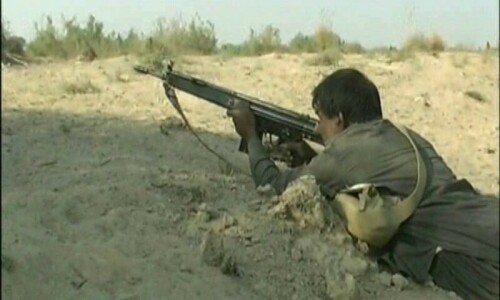
I am not referring to last week’s violent protests, which left several dead across Pakistan. Instead, I am referring to the recurring riots that often breakout after mega sports events or economic summits in the West. It appears that the youth and the disenfranchised in Europe and North America are equally culpable for violent protests. In May 2010, for instance, three died in street protests in Greece. Yesterday, the police fired rubber bullets at protesters in Madrid, Spain, who were trying to break through a cordon around the Parliament building.
Several pundits, columnists, and critics in Pakistan have expressed their disgust over last week’s violent protests against the blasphemous video. Some decreed Pakistanis to be a mob, and not a nation. Others pontificated that this was a result of a lack of education, inferring that an educated populace would have acted differently. While those in the opposition parties accused the government of failing to maintain law and order and protect public and private property.
If the lack of education or literacy were indeed responsible for violent protests in Pakistan, how would one explain the equally violent outbursts in the West? In May 2007, I saw firsthand rioters fighting with the police in Paris, France. It was the same day when Nicolas Sarkozy won the French Presidential elections. After having dinner with some friends who, being left-leaning French academics, were dismayed at the outcome, I returned to my hotel near Place de la Bastille. As I stepped out of the underground platform at the Metro Station, I was greeted by the eye-piercing odour of teargas.
The left-leaning French youth were out in full-force torching vehicles, destroying public and private property, and playing cat and mouse with the police. The streets around Place de la Bastille were filled with shattered glass and burnt vehicles. Fresh graffiti had suddenly defaced the historic Bastille monument and the buildings around it. Small gangs of youth were running through the streets, while the police chased them from one end of the boulevard to another.
It will be hard to argue that the lack of education could be the reason behind the violent outburst of the French youth. The French are indeed proud of their literary heritage, which is rich with libraries, universities, and museums. With a 99 per cent literacy rate, the French are one of the most literate people on the planet who are also proprietors of haute couture. If it is not the lack of education, what else could have motivated the French youth to turn violent?
Such violent protests, however, are not confined to the French youth. In 2010, the streets in downtown Toronto (Canada) were the scene of violent protests against the G-20 summit. The Canadian government spent hundreds of millions of dollars to preempt such violence. On the government's directives, streets were barricaded, buildings were vacated, universities were shut, the transit service was disrupted, and hundreds of suspects were arrested. Still protesters were able to torch police cruisers and destroy public property. Again, Canada also boasts a 99 per cent literacy rate where Toronto alone is home to three large universities and several colleges with over 250,000 students enrolled in institutes of higher learning.
While the rioters protesting against the G-20 summit in Toronto and other cities were expressing their discontent with the global economic order, others in the west have rioted for much less noble causes. In June 2011, youth in Vancouver ransacked the city after their ice hockey team lost to the team from Boston. The riots left over 140 people injured, including four with stab wounds. Several police were injured, while losses from arson and looting ran into hundreds of millions of dollars. The arrests revealed that several rioters were university students or alumni. Vancouver is also a highly literate city with several distinguished institutes of higher learning. Again, one cannot assume that the lack of education may have fuelled the rage and disorderly conduct of the youth who were incensed after the home team lost to the visitors.
Compared with the grievances of the youth in Vancouver, the protesters in Pakistan were enraged by a video that attacked their religious beliefs. At other times, Pakistanis are on the streets to protest against sectarian killings, shortage of staple foods, power outages and unending inflation, to name a few. The fact that the protesters hurt their own interests by burning public transit and other assets is perhaps indicative of the fact that the disenfranchised in Pakistan no longer see public assets as shared property. When the rioters torched several hundred railcars and locomotives after the assassination of Ms. Benazir Bhutto, they also sealed the fate of Pakistan Railways, which since the riots has not been able to meet the travel demand because of insufficient infrastructure.
It is not education in the traditional sense that would help prevent recurrence of such violent outbursts in Pakistan. What is needed is an equitable distribution of resources, the rule of law and civic education. Ordinary Pakistanis have to believe in the common good. This cannot be taught in schools or universities, this would evolve only when resources are shared amongst the masses in a just manner.
As long as Pakistan’s civil and military elites continue to hoard resources and amass wealth by denying masses their fair share, even the slightest provocation will cause violent outbursts.

The views expressed by this blogger and in the following reader comments do not necessarily reflect the views and policies of the Dawn Media Group.















































